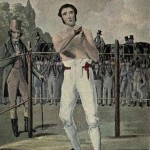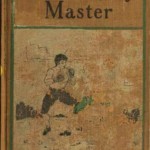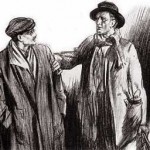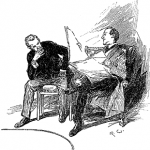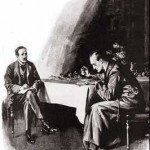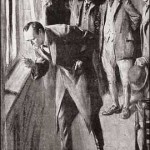The ninth round found both of them in fairly good condition. Montgomery’s head was still singing from the blow that he had in the corner, and one of his thumbs pained him acutely and seemed to be dislocated. The Master showed no sign of a touch, but his breathing was the more laboured, and a long line of ticks upon the referee’s paper showed that the student had a good show of points. But one of this iron-man’s blows was worth three of his, and he knew that without the gloves he could not have stood for three rounds against him. All the amateur work that he had done was the merest tapping and flapping when compared to those frightful blows, from arms toughened by the shovel and the crowbar.
It was the tenth round, and the fight was half over. The betting now was only three to one, for the Wilson champion had held his own much better than had been expected. But those who knew the ringcraft as well as the staying power of the old prize-fighter knew that the odds were still a long way in his favour.
“Have a care of him!” whispered Barton, as he sent his man up to the scratch. “Have a care! He’ll play thee a trick, if he can.”
But Montgomery saw, or imagined he saw, that his antagonist was tiring. He looked jaded and listless, and his hands drooped a little from their position. His own youth and condition were beginning to tell. He sprang in and brought off a fine left-handed lead. The Master’s return lacked his usual fire. Again Montgomery led, and again he got home. Then he tried his right upon the mark, and the Master guarded it downwards.
“Too low! Too low! A foul! A foul!” yelled a thousand voices.
The referee rolled his sardonic eyes slowly round. “Seems to me this buildin’ is chock-full of referees,” said he.
The people laughed and applauded, but their favour was as immaterial to him as their anger.
“No applause, please! This is not a theatre!” he yelled.
Montgomery was very pleased with himself. His adversary was evidently in a bad way. He was piling on his points and establishing a lead. He might as well make hay while the sun shone. The Master was looking all abroad. Montgomery popped one upon his blue jowl and got away without a return. And then the Master suddenly dropped both his hands and began rubbing his thigh. Ah! that was it, was it? He had muscular cramp.
“Go in! Go in!” cried Teddy Barton.
Montgomery sprang wildly forward, and the next instant was lying half senseless, with his neck nearly broken, in the middle of the ring.
The whole round had been a long conspiracy to tempt him within reach of one of those terrible right-hand upper-cuts for which the Master was famous. For this the listless, weary bearing, for this the cramp in the thigh. When Montgomery had sprang in so hotly he had exposed himself to such a blow as neither flesh nor blood could stand. Whizzing up from below with a rigid arm, which put the Master’s eleven stone into its force, it struck him under the jaw: he whirled half round, and fell a helpless and half-paralyzed mass. A vague groan and murmur, inarticulate, too excited for words, rose from the great audience. With open mouths and staring eyes they gazed at the twitching and quivering figure.
“Stand back! Stand right back!” shrieked the referee, for the Master was standing over his man ready to give him the coup-de-grâce as he rose.
“Stand back, Craggs, this instant!” Stapleton repeated.
The Master sank his hands sulkily and walked backwards to the rope with his ferocious eyes fixed upon his fallen antagonist. The timekeeper called the seconds. If ten of them passed before Montgomery rose to his feet, the fight was ended. Ted Barton wrung his hands and danced about in an agony in his corner.
As if in a dream—a terrible nightmare—the student could hear the voice of the timekeeper—three—four—five—he got up on his hand—six—seven—he was on his knee, sick, swimming, faint, but resolute to rise. Eight—he was up, and the Master was on him like a tiger, lashing savagely at him with both hands. Folk held their breath as they watched those terrible blows, and anticipated the pitiful end—so much more pitiful where a game but helpless man refuses to accept defeat.
Strangely automatic is the human brain. Without volition, without effort, there shot into the memory of this bewildered, staggering, half-stupefied man the one thing which could have saved him—that blind eye of which the Master’s son had spoken. It was the same as the other to look at, but Montgomery remembered that he had said that it was the left. He reeled to the left side, half felled by a drive which lit upon his shoulder. The Master pivoted round upon his leg and was at him in an instant.
“Yark him, lad! yark him!” screamed the woman.
“Hold your tongue!” said the referee.
Montgomery slipped to the left again and yet again; but the Master was too quick and clever for him. He struck round and got him full on the face as he tried once more to break away. Montgomery’s knees weakened under him, and he fell with a groan on the floor. This time he knew that he was done. With bitter agony he realized, as he groped blindly with his hands, that he could not possibly raise himself. Far away and muffled he heard, amid the murmurs of the multitude, the fateful voice of the timekeeper counting off the seconds.
“One—two—three—four—five—six——”
“Time!” said the referee.

